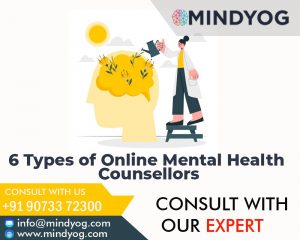We suffer from depression at various times in our lives for various reasons, but with time we can overcome that depression with the help of loved ones. But when this depression completely consumes us and does not allow us to face the difficult situations of life, what should we do? When should we consult a specialist for mental health treatment?
An easy way to know this is to first understand your problem (which can be due to various factors like feelings, emotions, sadness, anxiety, emotional mood swings, personal relationship problems, etc.). You need to know if it is causing problems in your work life, personal life or social life. Asking yourself or your loved one this way will help you understand exactly when you need to contact a psychologist.

First steps to seek help:
Most important is making the decision to seek help. You may not be able to bring yourself to ask for help. Because you may think that doing this will make people think you are crazy or insane. You may be advised by many to try to get out of this problem yourself.
Many people feel ashamed and guilty for these reasons, but it is important to remember that there is nothing to be ashamed of. When a person suffers from various physical problems like diabetes or hypertension or asthma, he does not shy away from getting the disease treated. In the same way, you have nothing to be ashamed of with a Psychologist or a psychiatrist either, because none of them will misunderstand you. You need to remember that getting help from someone will benefit you, and slowly you will start feeling better. You should also remember that your family members or a caregiver can help you recover more, especially if you are overwhelmed with depression and stress or are hesitant to ask for help.
Your decision matters:
Before visiting a Psychologist or a psychiatrist, there are a few things you should keep in mind that you have every right to, regardless of your situation.
1. Trustworthiness, Confidentiality, Respect and Dignity
2. Sensitivity to your needs and social background
3. A simple explanation of your treatment or how you will recover
4. Freedom to choose another specialist if your treatment does not work for that person
Before going to a specialist for the first time, make sure you feel comfortable with him. In this case his gender, age, religion, language, social background etc. are very important. There is nothing wrong with not seeing a psychiatrist for any of these reasons. How can you build a strong relationship with him if you don’t feel comfortable with him?
Collaborative collaboration required:
You need to understand that you and your Consultant are not different, but two different sides of the same coin. The two of you will figure out your health plan together. You can rest assured that your doctor will maintain complete confidentiality about your treatment or any conversations you have during treatment. A good treatment requires a good relationship, empathy between a patient and his consultant and both of them should try to develop this relationship. A good rapport building is mandatory for the further sessions to proceed. 🙂
How do I know which Consultant Psychologist or Psychiatrist is right for me?
Mental problems can be divided into two categories: psychological issues and psychiatric Disorders ..
- A psychologist or psychotherapist can help you with complete emotional and psychological problems, such as minor depression, anxiety or anxiety.
- But in case of abnormal depression or obsessive compulsive disorder, you should undergo psychological treatment, such as psychological counselling, along with medication.
- In extreme cases like paranoid schizophrenia, you may need a prescription to control hallucinations or delusions. You need to understand according to the extent and severity of your disease which Consultant will be best for you and help you recover soon. ( But you need to keep in mind that certain Disorders are not curable but are highly treatable and manageable.
If you realise that you are suffering from emotional or psychological problems, it is best for you to go straight to a Psychologist
After deciding to see a psychologist, you need to think about what kind of treatment you need. Most doctors treat a variety of mental health problems, but you can get the best treatment from a trained specialist. For example, if you have an eating disorder, you should see a specialist in that area. Or if there is any problem in personal relationship or marital life then one can go to a doctor experienced in marriage and family matters. Or if your child is worried about his test, take him to his school Psychologist ( if the Psychologist is present in the school) . Most people know exactly what they expect from their Consultant. They want their consultant to listen to them empathetically without judging them and encourage them to move towards a goal.
Deterioration of the mental state may also increase the level of symptoms, such as in the extreme stages of depression can cause unbearable headaches, depression, appetite and sleep disturbances or suicidal ideation. In that case the psychiatrist will give you antidepressants according to the symptoms of your disease and a psychologist will help you regain normal thinking and a happy life with the help of cognitive behaviour therapy.
Tell your medical history:
You should tell your doctor everything about your health. Report physical problems such as headaches, stomach aches, or behaviours such as smoking, drug addiction, or self-injury. Have you ever received any psychiatric treatment before?
Where can I find a specialist?
1. Your family doctor can refer you to him
2. Check with friends, relatives, or the neighbourhood
3. Sometimes doctors of friends or relatives can refer you to a specialist
4. Contact community services, physicians, counsellors, psychologists, psychiatrists, or social service agencies by looking in the telephone directory.
5. Find their contact numbers on the website of a non-profit, government or mental health organisation in your area
6. Some workplaces have their own Employee Assistance Program (EAP). Before going to them, check to see if they can maintain your privacy or if the program is legitimate.
7. You can also contact the psychology or psychiatry department of any hospital, government hospitals or medical college in the area.
8. Contact your insurance company. If you have any health or medical insurance, you can also find them through the insurance company.
9. You can also get out the websites of the psychological organisations.
10. You can also search from the Google of the Psychologist in nearby our location.
11. Certain toll free numbers are also available


